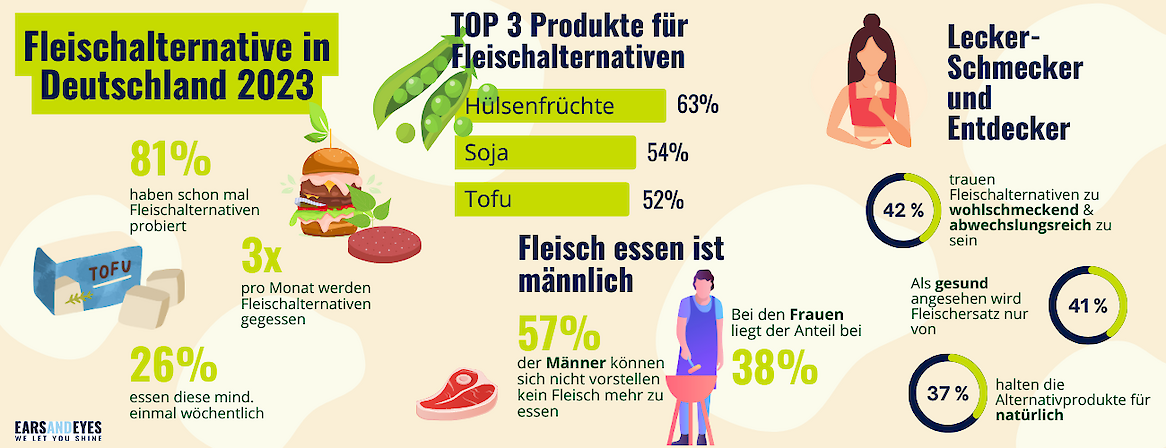
Meat alternatives in Germany 2023 – Vegetables are my meat
"If they don't want meat, let them eat tofu". The late French Queen Marie Antoinette never said it like that (nor did she say the other, more famous sentence), but one would still be tempted to misquote her when walking through the isles of a supermarket in 2023, seeing the vast selections of pea protein steaks and soy sausages. Meat alternatives, previously neglected by conventional retailers, have finally reached the middle of the consumer world. The shelves now offer a good selection of meat substitute products and dishes. For us, as a market research institute, it is particularly exciting to keep track of this change from a researcher’s point of view. We conducted and evaluated a study on this topic as early as 2021. This year, we were more than excited to see what has happened in this area - and a lot has happened!
Almost everyone has at least tried meat alternatives
Whether vegan, vegetarian or omnivore: almost everyone has tried meat alternatives at least once. 81 percent of the population living in Germany has eaten meat alternatives, which is 8 percent more than in 2021. And it often doesn’t stop with just trying it. In 2021, meat alternatives were consumed twice a month on average, but this number has now increased to three times a month. 26 percent even eat meat alternatives at least once a week - in 2021, that was just 15 percent!
Meat alternatives made from legumes, soy and tofu are preferred
If you're on social media trying to figure out how to create meat alternatives, it's easy to fall into a rabbit hole: the best recipe for the perfect meat alternative has become somewhat of a contest. On YouTube, Instagram or TikTok, you will find plenty of unusual recipes for minced rice cakes, radish bacon or cauliflower hot wings. In the supermarket, however, things are more conservative: buyers of meat substitutes usually choose products made from legumes (63%), soy (54%) or tofu (52%). At least every fourth buyer can warm up to mushrooms and seeds (26% each), seitan (12%), jackfruit (10%), lupines (10%) and tempeh (5%) still eke out a niche existence among consumers.
Many also want to continue to eat meat alternatives
The market continues to show potential: 36 percent want to consume meat alternatives regularly in the future. In 2021, it was just 23%. In addition, the fundamental rejection of meat alternatives is shrinking: the proportion of those who say they would never stop eating meat has fallen from 55% to 48% in the last two years. And while in 2021, 37% stated that they could not imagine being able to replace meat in a dish with another ingredient, in 2023, only 31% are of this opinion.
Despite the positive trend, manufacturers of meat alternatives face challenges
Even if the development looks positive from the consumer's point of view: A detailed look at the motivations of consumers reveals potential for improvement for the industry, especially regarding the image of meat alternatives.
Gourmets and explorers - with expectations for food
Taste decides what ends up on the plate. 93 percent of the Germans thinks it is important to eat tasty; food should also be varied (80 percent), healthy (78 percent) and natural (67 percent). And that doesn't just apply to omnivores: It's also particularly important to 89 percent of vegans and vegetarians that the food tastes good, only the health aspect received more approval from them (90 percent). To sum it up: taste is the ace, variety is king, health is queen, and naturalness is at least still the jack. And with precisely these four dimensions, meat alternatives are still struggling in the eyes of many consumers. They acknowledge that meat substitute products can help to eat in an animal-friendly manner (66%), but only 42 percent trust them to be tasty and varied. Only 41 percent see meat substitutes as healthy, and only 37 percent as natural. Noteworthy here: Even vegetarians and vegans share these opinions. Only half of them see meat alternatives as a way of eating naturally, and only 54 percent of vegetarians and vegans consider them healthy.

The cliché lives on: Eating meat is male
Conscious nutrition is still largely a female matter in Germany: women find healthy, natural, animal-friendly and environmentally friendly nutrition significantly more important than men. Conversely, it is men in particular who see themselves as staunch meat eaters (men: 55%, women 41%) and cannot imagine stopping eating meat (men: 57%, women 38%). It is not surprising that men eat animal meat and sausage products more often than women on average – 14 times a month compared to 11 times a month for women.
Conclusion: Meat alternatives have to be healthier and more natural... and more masculine!?
There is a lot of potential, especially among female customers, for meat alternatives. To tap into it, the perception of meat alternatives as healthy and natural foods must be strengthened. Perhaps it is the thought of the (supposedly) more processed product with many additives that prevents a more positive perception of meat alternatives here. Potential male customers, on the other hand, often still carry an intrinsic urge to consume meat that is only slowly adapting to the product range of a modern supermarket.
So are veggies and plants the new meat? Yes. At least for some. For more and more. Yet not so much for others. And never for some. Isn't that what makes this market - and our job as market researchers - so exciting?
ABOUT THE STUDY
Director of Studies: Leonid Rubinstein
Survey period: June 8 to 12, 2023
Universe: German resident population
Sample size: n = 500
Age group: 18-69 years old
Method: Online survey in the quality-controlled EARSandEYES access pool
Population-representative results quoted for age, gender. Alignment with official statistics for region using iterative weighting
THESE ARTICLES MIGHT ALSO INTEREST YOU:
DID YOU LIKE THIS ARTICLE?
Then have the latest articles sent directly to your mailbox once a month, free of charge.


